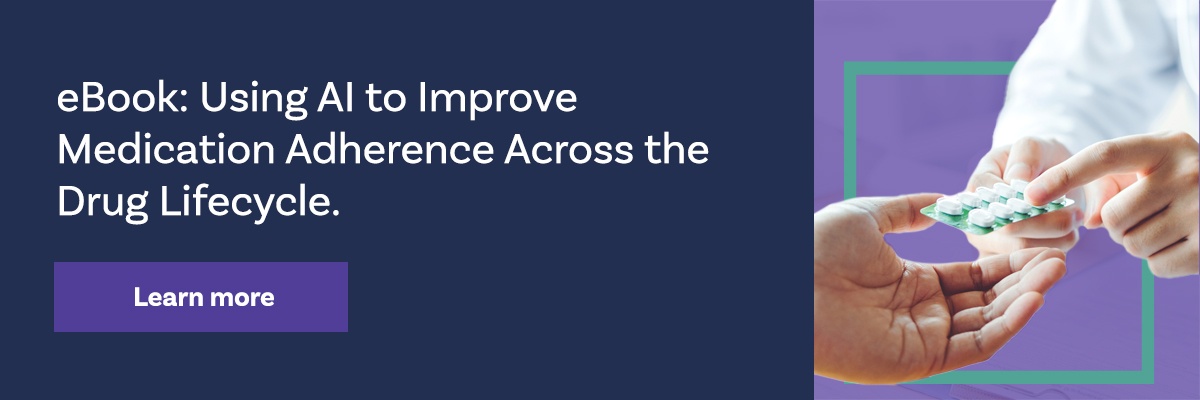Medication non-adherence is a serious issue contributing to increased healthcare costs, poor quality of life, health deterioration, and treatment failure. For every 100 prescriptions written, only around 25-30 are taken as directed.
Fortunately, there are tools available to help reduce medication non-adherence and address potential barriers to taking medication as prescribed. Numerous medication adherence barriers factor into non-adherence, including cost, incomplete patient education, limited health literacy, and forgetfulness.
Just like the adherence barriers that vary between each patient, the adherence strategy or tool that works best will also vary. Let’s consider what medication adherence tools there are and how they can improve patients starting and staying on therapy.

Medication Adherence Tools That Improve Patient Adherence
When personalized and precise to each individual, medication adherence tools can have a tremendous impact. Effective adherence tools include:
1. Smart Pill Bottles
In one type of smart pill bottle, the sensors in the bottle cap detect when the bottle is opened. In another, sensors in the bottle weigh the pills inside. Another bottle has light signals, sound signals, and text message reminders when it is time to take the medication. Additionally, if weekly adherence rates fall below a certain range, the bottle will activate a follow-up discussion with a pharmacist or coordinator.
According to a study published in the Journal of Managed Care & Specialty Pharmacy, smart pill bottle interventions increased medication adherence rates, and 60 percent of study participants rated the bottles favorably.
2. Medication Organizers
Medication organizers range from simple pillboxes divided into days of the week and times of the day to smart pill dispensers with various activation features, including home voice assistants and mobile apps. Patients can set their medication schedule in an app or the dispenser, load the dispenser with their pills for a certain number of days, and receive the appropriate dose with the press of a button.
These medication dispensers are also designed with caregivers in mind. Caregivers can manage the dispenser through a mobile app or receive alerts when their loved one misses a dose, simplifying the process for patients and their caregivers.
3. Smart Packaging
Not all medication can be emptied into smart pill dispensers. For this reason, there are smart blister packs that detect when a tablet is pushed from the pack and which specific pill is taken. Smart packaging can help patients and caregivers improve medication adherence.
4. Drug-Device Combinations
Some oral medications are embedded with bioingestible sensors. When the medication dissolves, it sends an alert to the patient’s phone via a wearable Bluetooth patch. This adherence information is then sent to their physician.
Similarly, smart inhalers integrate with a mobile app via Bluetooth and record information about the time and date the patient used the inhaler. Other external devices for inhalers give patients reminders to use their inhaler or alerts if they forget their inhaler at home. Although drug-device combinations track adherence, they may have even greater success when paired with another method, such as a medication reminder app.
5. Medication Reminder Apps
One of the most cost-effective medication adherence tools is a medication reminder app. Most of these apps are free to use and send alerts to patients that remind them to take their medication. They also record the patient’s medication history. Some apps are centered around medication detection, meaning the patient takes a photo of the inhaler or blister pack after they take their medication and uploads it to the app.
How to Use AI as a Medication Adherence Tool
Artificial intelligence (AI) can improve medication adherence too.
A one-size-fits-most approach is ineffective when it comes to healthcare. Patient support programs need to be more personalized to each individual for the strategies to work best. This is where AI comes in.
AI can tailor personalized experiences that are precise to each patient. AI such as the AllazoHealth Platform can predict the patients at high risk for non-adherence and determine who is most likely to be influenced by an outreach to allocate resources toward these individuals.
AllazoHealth’s AI pulls identified patient information such as prescription data, medical claims, historical program engagement, and consumer behaviors. After gathering this information, the AI identifies the highest risk patients most likely to benefit from personalization and targeting.
As a result, patient support program leaders get recommendations on the best messaging, timing, channel, and frequency for every patient. Some patients may respond better to higher-touch methods such as phone calls, whereas others respond to short text messages— AI considers these factors and provides the most effective and efficient methods for outreach to drive each individual’s next best action along their medication journey.
When managers use AllazoHealth, they know the outreach is delivered to the patients who benefit from it the most, leading to cost-efficient, effective, and successful programs that improve patient medication adherence.
